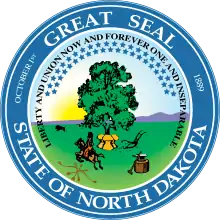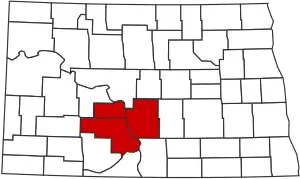Burleigh County, North Dakota
Burleigh County is a county in the U.S. state of North Dakota. As of the 2010 United States Census, the population was 81,308,[1] making it the second-most populous county in North Dakota. Its county seat is Bismarck,[2] the state capital. The county was named for Dakota Territory political figure Walter A. Burleigh.
Burleigh County | |
|---|---|
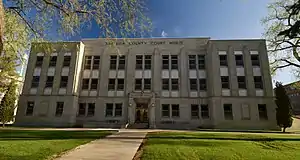 | |
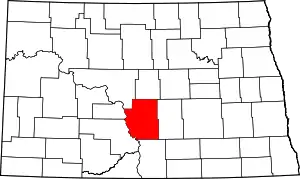 Location within the U.S. state of North Dakota | |
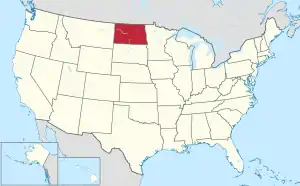 North Dakota's location within the U.S. | |
| Coordinates: 46°59′N 100°28′W | |
| Country | |
| State | |
| Founded | 1873 |
| Named for | Walter A. Burleigh |
| Seat | Bismarck |
| Largest city | Bismarck |
| Area | |
| • Total | 1,668 sq mi (4,320 km2) |
| • Land | 1,633 sq mi (4,230 km2) |
| • Water | 36 sq mi (90 km2) 2.1% |
| Population (2010) | |
| • Total | 81,308 |
| • Estimate (2019) | 95,626 |
| • Density | 49/sq mi (19/km2) |
| Time zone | UTC−6 (Central) |
| • Summer (DST) | UTC−5 (CDT) |
| Congressional district | At-large |
| Website | www |
History
The territorial legislature created Burleigh County on January 4, 1873, annexing territory from Buffalo County. Burleigh was not organized at that time, but the organization was effected on July 16, 1873. Its boundaries were altered in 1879, 1881, 1883, and twice in 1885.[3][4]
Burleigh County is included in the Bismarck, ND Metropolitan Statistical Area, commonly called "Bismarck–Mandan".
Geography
The Missouri River flows south-southeasterly along the lower west boundary line of Burleigh County. The central part of the county is drained by south-flowing creeks. The county terrain consists of semi-arid low rolling hills, partially devoted to agriculture.[5] The terrain slopes to the south, and its western portion also slopes to the river valley. The terrain's highest point is on the upper portion of the east boundary line, at 2,060' (628m) ASL.[6] The county has a total area of 1,668 square miles (4,320 km2), of which 1,633 square miles (4,230 km2) is land and 36 square miles (93 km2) (2.1%) is water.[7]
Adjacent counties
- Sheridan County – north
- Kidder County – east
- Emmons County – south
- Morton County - southwest
- Oliver County – west
- McLean County – northwest
Protected areas
- Arena State Game Management Area
- Bunker Lake State Game Management Area
- Canfield Lake National Wildlife Refuge
- Florence Lake National Wildlife Refuge
- Long Lake National Wildlife Refuge (part)
- Sibley Nature Park
- Wilton Mine State Game Management Area (part)
Lakes[5]
- Bunce Lake
- Bunker Lake
- Clear Lake
- Florence Lake
- Grass Lake
- Harriet Lake
- Horseshoe Lake
- Lonetree Lake
- Long Lake
- Mitchell Lake
- New Johns Lake (part)
- O'Brien Lake
- Pelican Lake
- Rice Lake
Demographics
| Historical population | |||
|---|---|---|---|
| Census | Pop. | %± | |
| 1880 | 3,246 | — | |
| 1890 | 4,247 | 30.8% | |
| 1900 | 6,081 | 43.2% | |
| 1910 | 13,087 | 115.2% | |
| 1920 | 15,578 | 19.0% | |
| 1930 | 19,769 | 26.9% | |
| 1940 | 22,736 | 15.0% | |
| 1950 | 25,673 | 12.9% | |
| 1960 | 34,016 | 32.5% | |
| 1970 | 40,714 | 19.7% | |
| 1980 | 54,811 | 34.6% | |
| 1990 | 60,131 | 9.7% | |
| 2000 | 69,416 | 15.4% | |
| 2010 | 81,308 | 17.1% | |
| 2019 (est.) | 95,626 | [8] | 17.6% |
| US Decennial Census[9] 1790-1960[10] 1900-1990[11] 1990-2000[12] 2010-2019[1] | |||
As of the 2010 census, there were 81,308 people, 33,976 households, and 21,213 families in the county.[13] The population density was 49.8 inhabitants per square mile (19.2/km2). There were 35,754 housing units at an average density of 21.9 per square mile (8.5/km2).[14] The racial makeup of the county was 93.0% white, 4.2% American Indian, 0.6% black or African American, 0.5% Asian, 0.3% from other races, and 1.4% from two or more races. Those of Hispanic or Latino origin made up 1.2% of the population.[13] In terms of ancestry, 61.0% were German, 21.1% were Norwegian, 8.1% were Russian, 6.8% were Irish, and 2.6% were American.[15]
Of the 33,976 households, 29.0% had children under the age of 18 living with them, 50.2% were married couples living together, 8.7% had a female householder with no husband present, 37.6% were non-families, and 30.5% of all households were made up of individuals. The average household size was 2.31 and the average family size was 2.90. The median age was 37.3 years.[13]
The median income for a household in the county was $53,465 and the median income for a family was $71,103. Males had a median income of $44,944 versus $31,943 for females. The per capita income for the county was $28,784. About 6.3% of families and 9.4% of the population were below the poverty line, including 11.6% of those under age 18 and 11.0% of those age 65 or over.[16]
Population by decade
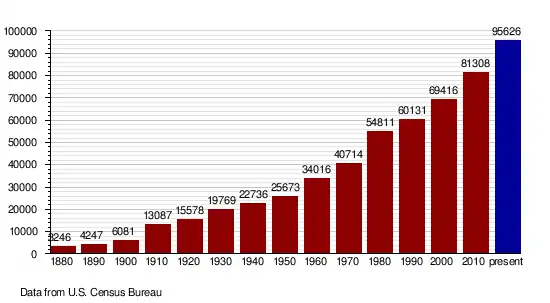
Communities
Townships
- Apple Creek
- Boyd
- Burnt Creek
- Canfield
- Christiania
- Clear Lake
- Crofte
- Cromwell
- Driscoll
- Ecklund
- Estherville
- Florence Lake
- Francis
- Ghylin
- Gibbs
- Glenview
- Grass Lake
- Harriet-Lien
- Hay Creek
- Hazel Grove
- Logan
- Long Lake
- McKenzie
- Menoken
- Missouri
- Morton
- Naughton
- Painted Woods
- Richmond
- Rock Hill
- Schrunk
- Sibley Butte
- Steiber
- Sterling
- Taft
- Telfer
- Thelma
- Trygg
- Wild Rose
- Wilson
- Wing
Politics
Burleigh County voters have voted Republican for several decades. In no national election since 1964 has the county selected the Democratic Party candidate.
| Year | Republican | Democratic | Third parties |
|---|---|---|---|
| 2020 | 68.5% 34,744 | 28.3% 14,348 | 3.3% 1,661 |
| 2016 | 67.8% 32,532 | 22.7% 10,881 | 9.5% 4,566 |
| 2012 | 64.4% 27,951 | 32.6% 14,122 | 3.0% 1,314 |
| 2008 | 60.6% 25,443 | 37.1% 15,600 | 2.3% 956 |
| 2004 | 68.5% 26,577 | 29.9% 11,621 | 1.6% 616 |
| 2000 | 65.2% 22,467 | 28.5% 9,842 | 6.3% 2,173 |
| 1996 | 51.7% 15,464 | 35.7% 10,679 | 12.5% 3,747 |
| 1992 | 50.9% 16,484 | 27.6% 8,940 | 21.5% 6,960 |
| 1988 | 61.9% 18,000 | 37.0% 10,760 | 1.1% 324 |
| 1984 | 68.3% 19,913 | 30.1% 8,781 | 1.7% 482 |
| 1980 | 67.9% 18,437 | 22.6% 6,129 | 9.5% 2,571 |
| 1976 | 58.1% 13,680 | 39.0% 9,188 | 2.9% 681 |
| 1972 | 67.4% 13,909 | 28.3% 5,841 | 4.3% 894 |
| 1968 | 64.0% 10,661 | 30.9% 5,139 | 5.1% 849 |
| 1964 | 47.0% 7,239 | 52.7% 8,120 | 0.4% 60 |
| 1960 | 62.1% 9,492 | 37.7% 5,761 | 0.2% 25 |
| 1956 | 73.8% 9,199 | 25.9% 3,231 | 0.3% 37 |
| 1952 | 79.6% 9,526 | 20.0% 2,400 | 0.4% 49 |
| 1948 | 59.5% 5,049 | 36.7% 3,117 | 3.9% 327 |
| 1944 | 60.0% 4,616 | 39.8% 3,061 | 0.3% 23 |
| 1940 | 57.1% 5,858 | 42.4% 4,350 | 0.6% 58 |
| 1936 | 25.2% 2,447 | 64.9% 6,314 | 9.9% 962 |
| 1932 | 31.8% 2,687 | 66.6% 5,621 | 1.6% 131 |
| 1928 | 55.6% 3,955 | 43.2% 3,076 | 1.2% 84 |
| 1924 | 53.2% 3,152 | 6.4% 379 | 40.4% 2,397 |
| 1920 | 77.3% 4,300 | 17.0% 943 | 5.8% 321 |
| 1916 | 45.5% 1,182 | 48.7% 1,267 | 5.8% 151 |
| 1912 | 36.2% 720 | 30.6% 609 | 33.2% 660 |
| 1908 | 65.8% 1,375 | 31.6% 660 | 2.6% 54 |
| 1904 | 83.2% 1,340 | 14.7% 237 | 2.1% 33 |
| 1900 | 66.4% 679 | 33.2% 339 | 0.4% 4 |
References
- "State & County QuickFacts". United States Census Bureau. Archived from the original on July 7, 2011. Retrieved October 31, 2013.
- "Find a County". National Association of Counties. Archived from the original on May 31, 2011. Retrieved June 7, 2011.
- "Dakota Territory, South Dakota, and North Dakota: Individual County Chronologies". Dakota Territory Atlas of Historical County Boundaries. The Newberry Library. 2006. Retrieved February 2, 2015.
- "County History". North Dakota.gov. The State of North Dakota. Archived from the original on February 2, 2015. Retrieved February 2, 2015.
- Burleigh County ND Google Maps (accessed February 16, 2019)
- ""Find an Altitude/Burleigh County" Google Maps (accessed 16 February 2019)". Archived from the original on May 21, 2019. Retrieved February 16, 2019.
- "2010 Census Gazetteer Files". US Census Bureau. August 22, 2012. Archived from the original on January 29, 2015. Retrieved January 27, 2015.
- "Population and Housing Unit Estimates". Retrieved March 26, 2020.
- "US Decennial Census". US Census Bureau. Retrieved April 10, 2016.
- "Historical Census Browser". University of Virginia Library. Retrieved January 27, 2015.
- Forstall, Richard L., ed. (March 27, 1995). "Population of Counties by Decennial Census: 1900 to 1990". US Census Bureau. Retrieved January 27, 2015.
- "Census 2000 PHC-T-4. Ranking Tables for Counties: 1990 and 2000" (PDF). US Census Bureau. April 2, 2001. Retrieved January 27, 2015.
- "Profile of General Population and Housing Characteristics: 2010 Demographic Profile Data". US Census Bureau. Archived from the original on February 13, 2020. Retrieved March 14, 2016.
- "Population, Housing Units, Area, and Density: 2010 - County". US Census Bureau. Archived from the original on February 13, 2020. Retrieved March 14, 2016.
- "Selected Social Characteristics in the US – 2006-2010 American Community Survey 5-Year Estimates". US Census Bureau. Archived from the original on February 13, 2020. Retrieved March 14, 2016.
- "Selected Economic Characteristics – 2006-2010 American Community Survey 5-Year Estimates". US Census Bureau. Archived from the original on February 13, 2020. Retrieved March 14, 2016.
- Leip, David. "Atlas of US Presidential Elections". uselectionatlas.org. Retrieved April 12, 2018.
External links
- A brief history of Burleigh County : with a chronology of some of the county's earlier days (1932) from the Digital Horizons website
- A brief history of Burleigh County : with a chronology of some of the outstanding events of the county's earlier days (1932) from the Digital Horizons website
- Burleigh County maps, Sheet 1 (northern) and Sheet 2 (southern), North Dakota DOT
